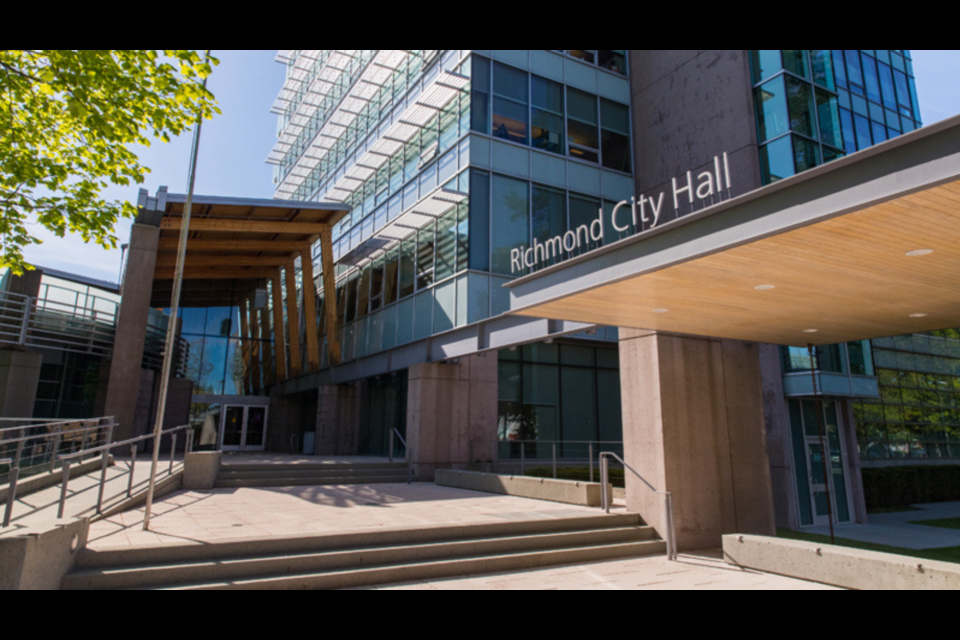City hall's biggest decisions this year revolved around real estate and public safety.
Supportive housing
One of the biggest Richmond City Hall stories was the suspension of a proposed supportive housing development in Richmond at Sexsmith and Cambie Road, although the ultimate decision was made by the provincial government.
In late June, a proposal from BC Housing was received by the city to construct a 90-unit building to address the need for housing and reduce the risk of those experiencing homelessness in Richmond.
The building, on a city-owned lot, would have had studio apartments with bathrooms and kitchenettes. A tenant support office was planned for the building.
Shortly after receiving the application from BC Housing, the city called on residents for feedback on the project – many of whom strongly opposed the building.
One group, led by Richmond resident Sheldon Starrett, held a rally in early August with a few hundred residents in attendance opposing the development.
Elenore Sturko, a Surrey MLA with the BC Conservative party, also attended the rally.
In a video of the event posted to X, Sturko said Richmondites were seeing record overdose deaths, rising street chaos, and were feeling unsafe in their community – adding the people of Richmond weren’t going to take it anymore.
On Aug. 30, Housing Minister Ravi Kahlon announced the project would be suspended for now.
Currently, the project remains on hold, with the provincial government directing BC Housing to undertake more public consultation on the project as well as explore other possible locations, said City of Richmond spokesperson Clay Adams.
Densification and stratification
One of Richmond's most biggest real estate decisions was made by council in June, allowing for the densification and stratification of single-family lots across the city.
But, in fact, city council didn't have much choice but to allow the densification as it was mandated by provincial legislation.
Following the approval of Bill 44 last year, municipalities across the province with more than 5,000 residents were required to update their zoning regulations to allow small-scale, multi-unit housing by June 30.
These pieces of legislation affected more than 25,000 single-family properties in Richmond to have between three to six housing units built on them, depending on the size, which could potentially add around 100,000 homes to the city.
Bill 47 allowed even more densification around transit hubs.
The magnitude of the change was described by city staff as “unprecedented.”
The question then for city council was whether or not to allow these properties to be stratified.
Staff’s recommendation was to allow only rentals on densified lots, with an option to stratify with prior council consultation.
Home designer Brad Dore spoke to council about the need to allow stratification, adding most of his clients would just build single-family homes if stratification weren't allowed.
Developers of small-scale strata units need high-quality homes because they have to compete with condos and townhomes – these standards aren’t the same for rental units, he added.
In the end, city council went against staff's recommendation and voted to allow stratification on densified lots.
As for Bills 44 and 47, city council expressed its concerns to the province about the impact densification could have on infrastructure, successfully receiving an extension for an area in Steveston until 2030.
Nevertheless, the rezoning is now in place in Richmond and across B.C.
Tokyo Beauty business license
A public safety story that recently drew the attention of Richmondites was the shutdown of one of Tokyo Beauty’s locations, after Health Canada found illegal products on their shelves.
In late November, Richmond city council cancelled the business license of the Hazelbridge Way location of the beauty store.
This was after Health Canada issued several warnings that the store, which is owned by Nagoya Trading, was selling illegal products on their shelves. This included Pabron Gold A, a medication containing an opiate called dihydrocodeine phosphate that is regulated under the Controlled Drugs and Substances Act.
Notably, city council gave a three-month suspension to Tokyo Beauty's Westminster Highway location last year after a similar Health Canada warning.
At a hearing, lawyers on behalf of Tokyo Beauty insisted the cancellation of their license wasn’t appropriate, saying a rehabilitation plan with compliance audits would be more fitting.
A unanimous vote from city council on Nov. 25 sealed the fate of the Hazelbridge Way location, with Coun. Kash Heed stating he would have preferred to cancel the business license of all three locations.
Coun. Laura Gillanders underscored the seriousness of the situation, saying the business’ defence team was downplaying it. Gillanders also mentioned previous warnings weren’t effective and the cancellation was warranted.
“This goes much higher than that and if this sends Nagoya Trading a message that they need to stop importing illegal products and putting them on shelves at various stores across Richmond, that’s absolutely what we need to do,” she explained.
- with files from Maria Rantanen and Valerie Leung
Got an opinion on this story or any others in Richmond? Send us a letter or email your thoughts or story tips to [email protected]. To stay updated on Richmond news, sign up for our daily headline newsletter. Words missing in article? Your adblocker might be preventing hyperlinked text from appearing.



